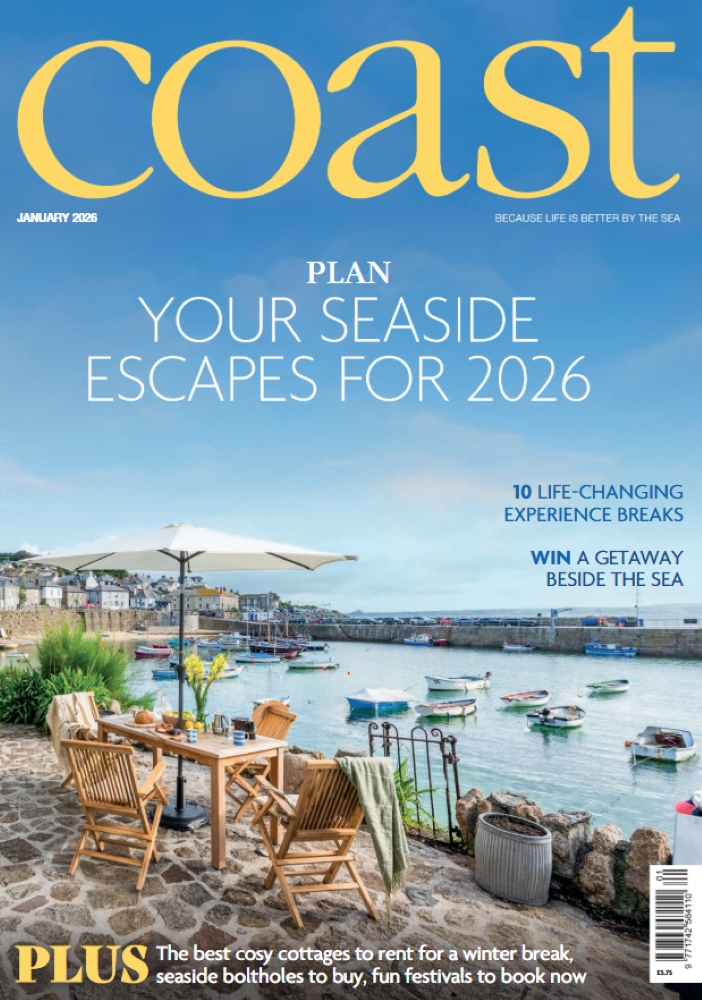KEVIN PILLEY meets the world’s trendiest beach clean-up service, who are turning litter into high fashion.
Ghosts had been reported on the beach in the Gannel estuary. Members of the Big Green Surf School and Crantock Surf Life Saving Club, along with Harry Dennis, Amy Gosney and Reef, their ocean-positive border collie, were the first beach clean-up responders.
Within two hours, racing the incoming tide, a huge pile of entangled potting rope, broken lobster pots and chunks of metal – or ‘ghost gear’ to use the collective term – had been dragged off the beach behind a 4×4, forklifted into the back of a truck and taken away. All to be made into Waterhaul sunglasses.
“All our actions are anchored in purpose,” says Waterhaul co-founder and CEO, Harry. He and his team are after one thing…polymers.
These beachcombers’ wish lists have changed. No longer of so much interest are shells, sea glass, driftwood, bottles, fossils, coins and other conventionally collectible and potentially valuable flotsam and jetsam. Now they are searching for seashore souvenirs to turn into chic shades.
Harry adds: “It feels great every time to be involved in a rescue and recovery operation that makes a positive impact so close to our home. Harnessing its strength – which causes so many problems in the ocean – the plastic is re-purposed into our 100 per cent recycled eyewear.”
The Waterhaul team is out every month, rain or shine. And low tide. Nobody knows when the next call-out will be.
“The team has scoured remote sections of the coastline, scaling some of Cornwall’s tallest cliffs and even abseiling to gain access to some locations,” reveals Harry, a graduate of the University of Plymouth and Wales, Aberystwyth, and formerly science and policy officer at Surfers Against Sewage, “In a three-day blitz we covered over 20 miles of beaches, coves and caves. The team has scoured remote sections of the coastline, scaling some of Cornwall’s tallest cliffs and even abseiling to gain access to some locations, to recover enough ghost gear to fill our 8ft x 5ft trailer.”

Cleaning up our seas with Behaviour Change Cornwall
Founded in Cornwall in 2018, Waterhaul is a social enterprise run by a group of frustrated surfers, marine conservationists and fashion-conscious eco-warriors who have declared war against these ghosts of the fishing industry. Their polypropylene booty is made into Italian-engineered, hand-finished, polarised sunglasses.
As co-founder Gavin Parker explains: “High polymer nets are a desirable recycling resource. We partnered with several mechanical recycling facilities to help sort, wash, shred and process various forms of end-of-life fishing gear, before finally producing our first pair of recycled ocean plastic purposeful sunglasses in 2018.”
Waterhaul uses Barberini mineral glass lenses which offer superior optical quality, scratch resistance and sustainability than comparable high-end plastic counterparts.
Gavin continues: “Ghost gear is the most abundant form of plastic in our oceans, the most harmful. It’s literally designed to catch and kill marine life and will continue in a cycle of doing just that, for centuries.
“A study by The World Economic Forum claims that – without action – by 2050, the weight of plastics in the ocean could be greater than the weight of fish. Another survey claims there are already over five trillion pieces of plastic in our waters.
“The root cause of the problem is that this plastic is perceived to be waste, with no value. It’s a human behaviour problem – and human behaviour is driven by value. At Waterhaul, by recovering, recycling and redesign, what we’re doing is giving worth to this material.”
And Harry concludes: “Having witnessed the impacts of ghost gear first-hand and close-up whilst diving, I’m motivated by changing people’s perceptions of plastic ‘waste’ and combining environmental and social purpose into our work. And have some fun doing it! Litter picking is also very therapeutic.”
And thanks to initiatives like Waterhaul, the net is surely closing in on ocean debris all the time.







